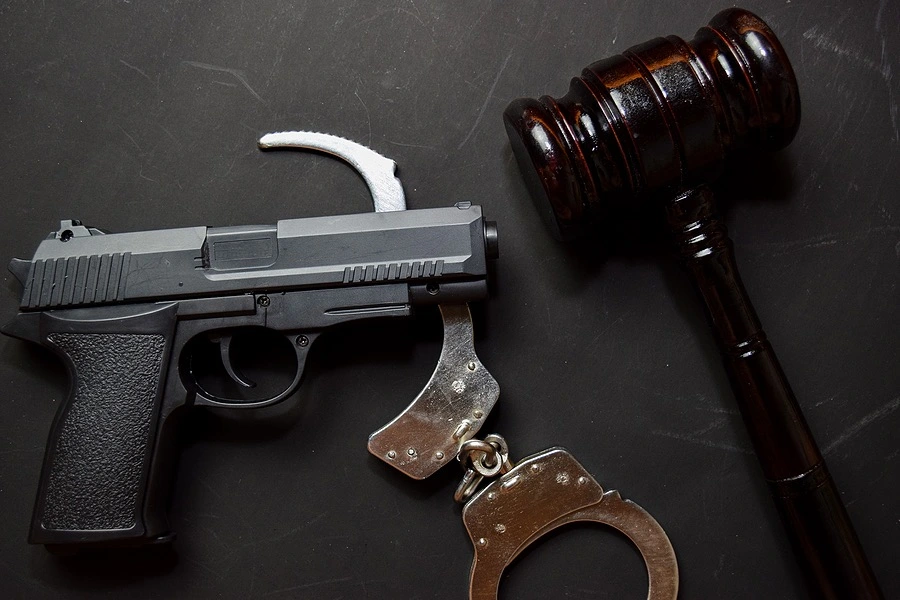Get the Best Robbery Lawyers in Stuart, FL – How to Find the Right Defense Attorney
Imagine being accused of a robbery you didn’t commit or facing serious charges due to a momentary lapse in judgment. Your entire future is on the line. The importance of having strong robbery lawyers cannot be underestimated. This article will guide you through the intricacies of robbery charges in Florida, the different degrees of felony for robbery offenses, and the importance of hiring an experienced criminal defense attorney. We will explore common defenses against robbery charges and provide tips on how to choose the right robbery lawyers for your case. Let’s begin by understanding robbery charges in Florida.
Key Takeaways
- Robbery offenses in Florida can range from a first-degree felony to a third-degree felony, with serious consequences.
- Having an experienced criminal defense attorney is essential for developing strong defenses and negotiating plea deals.
- When selecting a robbery defense attorney, consider their experience and track record, client focus approach and fee structure.
Understanding Robbery Charges in Florida

In Florida, robbery is a criminal offense. It involves unlawfully taking money or property from its rightful owner with the use of force, violence, or threats. As a criminal offense, it is generally considered to be a felony, and a conviction can result in a permanent criminal record. Florida recognizes various robbery offenses, including armed robbery, home invasion, and sudden snatching, each with its own set of consequences and penalties.
We will scrutinize each of these robbery charges in the following sections.
Armed Robbery
Armed robbery is a felony offense and involves the use of weapons such as firearms or other dangerous arms. It occurs when an individual forcibly takes someone else’s money, property, or assets by threatening violence or using force. In Florida, armed robbery charges are classified as first-degree felonies due to their severity and the involvement of force or violence in temporarily depriving someone of their property.
Defending against armed robbery charges can be complex and requires the expertise of an experienced criminal defense attorney. Some common defenses that may be considered against criminal charges of armed robbery include insufficient evidence, mistaken identity, and lack of intent. Anyone charged with robbery offenses should seek legal counsel promptly, particularly if the act was committed before the arrest and the defendant is oblivious to the charges.
Home Invasion
Home invasion robbery is another serious charge under Florida law. It is defined as entering a dwelling with the intent to unlawfully take property or money from the occupants through the use of force, violence, or threat, essentially committing robbery within a home. Because robbery is considered a violent crime in Florida, the penalties for home invasion robbery can include up to 30 years in prison, 30 years of probation, and up to $10,000 in fines.
Burglary in the second degree, a distinct robbery offense, involves unlawfully entering a dwelling, whether it is occupied or unoccupied, with the structure or conveyance being occupied at the time of the crime. When accused of home invasion, having a proficient robbery defense attorney who is well-versed in Florida law and capable of presenting the strongest defense for your case is a necessity.
Sudden Snatching
Sudden snatching in Florida refers to the criminal act of robbery by sudden snatching, which involves the abrupt and unexpected taking of money or other property from a person with the intent of depriving them of it permanently. This type of theft crime becomes a more serious offense if the offender is found to have carried a firearm or other deadly weapon during the robbery.
Robbery by sudden snatching is classified as a third-degree felony in Florida, punishable by a maximum of 5 years in prison.
Degrees of Felony for Robbery Offenses

In Florida, robbery offenses can be classified as either a first-degree felony or a second-degree felony, depending on whether a weapon was used during the crime. Those convicted of second-degree felony robbery may receive a sentence of up to five years in state prison and fines no higher than $10,000. First-degree felony robbery carries a harsher penalty with a possible nine year imprisonment and any applicable fines..
We will now discuss first and second-degree felony robbery charges extensively.
First Degree Felony
A first-degree felony in Florida is the most serious degree of felony classification and is punishable by a term of imprisonment and can result in severe penalties. The possible penalties for first-degree felony robbery in Florida include a prison sentence of up to 30 years and a fine of up to $10,000. If the offender is found to have used a deadly weapon during the robbery, the potential penalties can be even more severe, including a maximum prison sentence of life imprisonment.
When faced with first-degree felony robbery charges, it’s imperative to enlist the help of a seasoned criminal defense attorney. They can assess the prosecution’s case, bargain plea deals, and devise a powerful defense strategy to protect your rights and future.
Second Degree Felony
A second-degree felony in Florida is a grave offense that falls under the classification of felonies. It is one of the five classifications of felonies in Florida, which include:
- Capital felony
- Life felony
- First-degree felony
- Second-degree felony
- Third-degree felony
The penalties for robbery without using a deadly weapon in Florida can be up to 15 years in prison. Retaining a seasoned criminal defense attorney is vital to safeguard your rights and strive for the most favorable outcome in your case.
The Importance of an Experienced Criminal Defense Attorney

Retaining a seasoned criminal defense attorney is crucial for:
- Upholding your rights
- Challenging the prosecution
- Obtaining the robust, competent representation needed to fight for your future
- Ensuring high-quality representation for your case.
An experienced criminal defense attorney can assist in evaluating the prosecution’s case, developing a strong defense strategy, and negotiating plea deals. Criminal defense attorneys play a crucial role in these aspects, and we will further explore their significance to enhance our understanding.
Evaluating the Prosecution’s Case
Evaluating the prosecution’s case involves:
- Carefully assessing the strength of the evidence and arguments presented by the prosecution in a legal case
- Analyzing the credibility of witnesses
- Examining the admissibility of evidence
- Identifying any weaknesses or inconsistencies in the prosecution’s case
- Determining the overall persuasiveness of their arguments.
Such evaluation paves the way for defense attorneys to shape and prepare their defense against the prosecution’s case. Hence, it’s paramount to seek the guidance of a seasoned criminal defense attorney who can steer you through this process and strive for the most favorable outcome.
Developing a Strong Defense Strategy
Developing a strong defense strategy is vital for any robbery case, as it can significantly impact the outcome. With the help of an experienced criminal defense attorney, you can identify the most effective defenses available for your case, such as insufficient evidence, mistaken identity, or lack of intent.
A robust defense strategy can weaken the prosecution’s case and increase the likelihood of a favorable outcome for the defendant.
Negotiating Plea Deals
The role of a defense attorney in negotiating plea deals for robbery charges is crucial, as it can significantly influence the final outcome of your case. An experienced criminal defense attorney can engage in negotiations with the prosecution to secure a reduced charge or sentence in exchange for a guilty plea. This can be particularly advantageous for defendants who wish to avoid the risks associated with a trial or reduce the severity of the charges they face.
Understanding the process of negotiating plea deals and the potential consequences of accepting or rejecting a plea deal is crucial for making informed decisions about your case.
Common Defenses Against Robbery Charges

Having elucidated the significance of a seasoned criminal defense attorney, let’s now delve into some prevalent defenses against robbery charges. These defenses include insufficient evidence, mistaken identity, and lack of intent.
Each of these defenses can play a vital role in weakening the prosecution’s case and increasing the likelihood of a favorable outcome for the defendant. We will scrutinize each of these defenses more comprehensively.
Insufficient Evidence
Insufficient evidence is a powerful defense against robbery charges, as it can prevent the prosecution from proving the defendant’s guilt beyond a reasonable doubt. Examples of insufficient evidence include:
- Unreliable eyewitness testimony
- Circumstantial evidence that is not sufficient to prove guilt
- Evidence that has been compromised or is otherwise unreliable.
Retaining a seasoned criminal defense attorney who can spot and question any insufficient evidence in your case is vital for a strong defense.
Mistaken Identity
Mistaken identity is another common defense against robbery charges, as it asserts that the defendant was incorrectly identified as the individual responsible for the crime. This defense can be particularly effective when there is weak or unreliable eyewitness testimony, or when the prosecution’s case relies heavily on circumstantial evidence.
If you find yourself wrongly accused of robbery as a result of mistaken identity, it’s crucial to remain calm and promptly seek the guidance of a criminal defense attorney.
Lack of Intent
Lack of intent is a defense against robbery charges that argues the defendant did not possess the deliberate and voluntary mental state required for the perpetration of the crime, such as an intentional and unlawful threat. This defense can be particularly effective when there is evidence suggesting the defendant acted out of fear, panic, or other extenuating circumstances, rather than with the intent to temporarily deprive someone of their property, especially if the act occurred prior to the alleged robbery.
A seasoned criminal defense attorney can assist in figuring out if ‘lack of intent’ can serve as a viable defense in your case and the best way to present it in court.
How to Choose the Right Robbery Defense Attorney

Selecting the appropriate robbery defense attorney is key to achieving the most favorable outcome in your case. There are several factors to consider when selecting an attorney, such as their experience and track record, their client-focused approach, and their transparent fee structure.
In the succeeding sections, we will delve into these factors more comprehensively and provide guidance on selecting the most suitable attorney for your robbery case.
Experience and Track Record

An attorney’s experience and track record are critical factors to consider when choosing a robbery defense attorney. Their experience in handling robbery cases will ensure they have the knowledge and skills necessary to navigate the complexities of your case, while their track record demonstrates a history of successful outcomes.
When assessing an attorney’s experience and track record, it is important to examine the number of years they have been practicing, the types of cases they have handled, and the outcomes of those cases.
Client-Focused Approach
A client-focused approach is another essential factor to consider when selecting a robbery defense attorney. An attorney with a client-focused approach is dedicated to safeguarding your best interests and providing the optimal defense for your case. This type of approach can offer various advantages, such as a more comprehensive understanding of your needs, more individualized attention, and a higher likelihood of success in your case.
To find a robbery defense attorney with a client-focused approach, assess their experience and track record, request references, and inquire about their fee structure.
Transparent Fee Structure
A transparent fee structure is essential when selecting a robbery defense attorney, as it enables you to understand the costs associated with the legal services you are receiving. This helps ensure that you are not overpaying for services and that you are obtaining the maximum value for your money.
When searching for a robbery defense attorney with a transparent fee structure, inquire about their fees and ensure that you understand the expenses associated with their services. Additionally, research the attorney’s record and confirm that they have expertise in dealing with robbery cases.
Meltzer & Bell, P.A.: Providing Tenacious Robbery Defense in Stuart, FL with a Proven Track Record of Success

As Robbery Lawyers in Stuart, FL, Meltzer & Bell, P.A. offers dedicated and aggressive legal defense for individuals accused of robbery. Here’s how they can assist you:
- Hard-Hitting Defense: With a promise to fight for your rights, Meltzer & Bell, P.A. is committed to providing a robust defense strategy tailored to your case, ensuring that every legal avenue is pursued to protect your freedom.
- Experienced Legal Team: The firm boasts a diverse team of top-tier attorneys, including a former felony special unit prosecutor and former public defenders, bringing a wealth of knowledge and tactical experience from both sides of the courtroom.
- Proven Track Record: With over 500 combined jury trials through verdict and a history of significant case victories in Florida, the firm demonstrates a consistent ability to navigate complex legal systems and achieve favorable outcomes.
- Client-Centered Approach: Understanding the importance of clear communication and personalized service, Meltzer & Bell, P.A. prides itself on over 700 5-star reviews, reflecting their commitment to client satisfaction and legal excellence.
- Comprehensive Legal Representation: The firm doesn’t resort to quick plea deals; instead, they are prepared to fight tooth and nail, utilizing their extensive experience and resources to challenge charges and seek the best possible outcome for your case.
- Decades of Combined Experience: The team’s extensive experience in criminal defense allows them to handle all aspects of your case confidently, from initial consultation through trial or settlement.
By choosing Meltzer & Bell, P.A. as your robbery defense attorneys in Stuart, FL, you are assured a dedicated team that will strive for the most favorable resolution, backed by a firm commitment to legal excellence and client advocacy.
Summary
In conclusion, understanding robbery charges in Florida and the importance of having an experienced criminal defense attorney on your side is crucial for anyone facing such accusations. We’ve discussed the different types of robbery charges, the various degrees of felony for robbery offenses, and the importance of hiring a skilled defense attorney. Furthermore, we’ve explored common defenses against robbery charges and provided tips on how to choose the right attorney. By taking these factors into consideration and seeking professional legal advice, you can protect your rights and fight for a favorable outcome in your robbery case.
Frequently Asked Questions
What are elements of robbery?
Robbery involves taking property without the owner’s consent and typically using force or threats of harm. It requires taking valuable property from an individual or in their custody, as well as the use of assault, violence, force or putting someone in imminent fear of harm.
How does robbery differ from larceny?
Robbery is a more serious offense than larceny because it includes some form of physical force, violence or assault. Larceny-theft is defined as the unlawful removal of property, and burglary is defined as the unlawful entry into almost any structure with the intent to commit a crime inside. In comparison, robbery is the violent theft of property or money.
Is robbery a specific intent crime?
Yes, robbery is a specific intent crime as it requires the defendant to have the intent to steal the property of another.
What is an example of robbery?
Robbery is a crime against a person that involves violent action. It can range from a street mugging to robbery of a shop, business or security vehicle and it is treated more seriously than theft with harsher punishments, including life sentences. Robbery is a serious offence and is punishable by law. The severity of the punishment depends on the type of robbery and the amount of money or property
How much time can you get for armed robbery in Florida?
If convicted of armed robbery in Florida, you may face a minimum sentence of 34.5 months (nearly three years) in prison, or up to 30 years.
